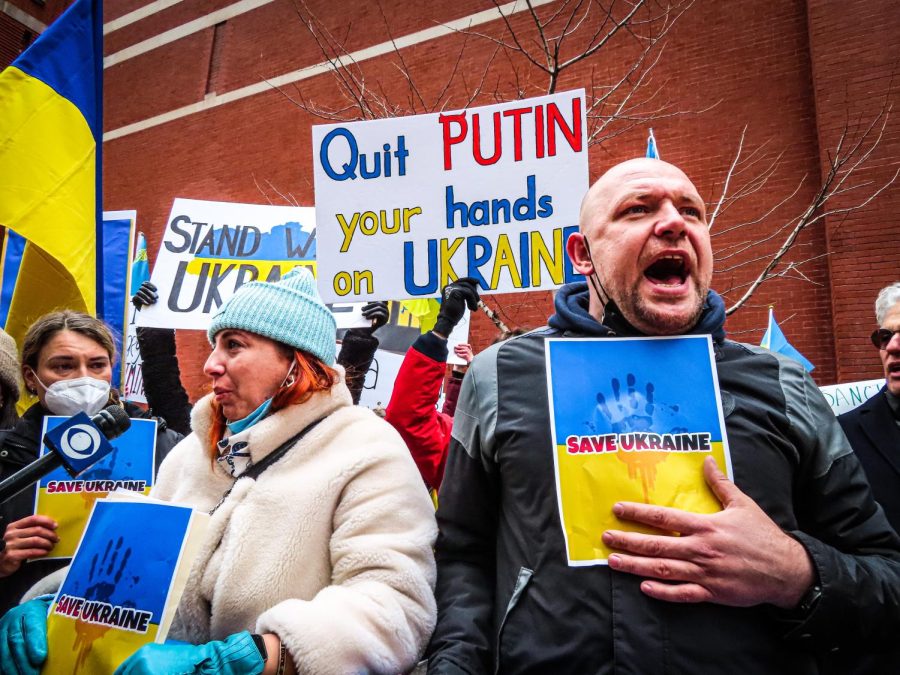It will soon be a year since the morning of Feb. 24, when Russian President Vladimir Putin announced a “special military operation” into Ukraine, with the goal to quickly annex parts of the country. In hopes to reignite Russian support for his presidency, Putin expanded Russian control in the territory of the former Soviet Union.
Russia began the invasion through both missile strikes targeting major cities, including the capital Kyiv, with troops moving into eastern and southern Ukrainian cities by land and water. This war has severely involved and harmed civilians.
“It seems that this was supposed to be a short, glorious, successful war, just like the Crimean annexation was seen in 2014 [within Russia],” said Alina Parker, a communications PhD. candidate and lecturer at the University of Massachusetts. Parker focuses on the history and politics of Russia in the aftermath of the annexation of Crimea in 2014.
“It must have been an attempt to repeat that ‘success’ because that hugely boosted the popularity of the Russian government [within the country],” she said.
The initial group of soldiers which had first invaded Ukraine were military police. They are used within Russia to suppress and control large political protests, rather than army troops. Parker noted the correlation between the mobilization of military police and the rumors of Russian confidence in Ukrainian acceptance.
“There was this idea of the Crimean consensus, that the people who never thought that they wanted Crimea…that they needed it to be part of Russia,” Parker said. “People in part were probably encouraged to think that this must not be just Crimeans, but that there are other people who also feel like they belong to Russia.”
In response to the Russian invasion of Ukraine, Volodymyr Zelenskyy, president of Ukraine, enacted martial law and announced the prohibition of international travel for men aged 18 to 60. The duration of this restriction was stated to last while martial law continued to be the presiding method of law enforcement.
Over the summer, without the input of Zelenskyy, Ukrainian army generals expanded on the restriction by declaring that men who can serve should remain in their home districts in order to make conscription easier.
While this travel restriction was implemented to prepare for the potential need for civilian men to be conscripted into the military, it resulted in families either being separated or put into harm’s way. Earlier this fall on Oct. 19, it was reportedthat the “conscription for compulsory military service while martial law is in effect,” was abolished.
According to political science professor Charli Carpenter, the Ukrainian government should reassess the necessity of this “travel ban on male civilians” to mitigate the presence of civilians in the warzone and to make it easier for families to find refuge without having to be separated. Carpenter is the director of the Human Security Lab at UMass.
In the spring of this year, Carpenter went to the Polish-Ukrainian border to aid in humanitarian efforts and assist those seeking refuge elsewhere. One woman she aided with transportation and accommodation in Amsterdam was almost nine months pregnant at the time.
She had to leave her son and husband behind in Ukraine, as her husband could not join her due to the travel restrictions. Carpenter said that this woman had recently contacted her in regard to getting help to return to Kyiv with her newborn baby, to be with her husband and son.
The travel ban of men from the ages of 18 to 60 has not only separated families, but placed civilians in dangerous positions. Russia is consistently shelling electrical infrastructure, residential buildings and hospitals over the course of the war.
“It is unprecedented, what has happened in terms of the destruction of infrastructure,” said Bogdan Prokopovych, Ukrainian citizen and senior lecturer of management at UMass. “It is very problematic because these are the critical objects that are being targeted by the missile strikes. Waging a war, not against the military, but against the population, trying to create panic.”
“Winter is being weaponized,” Prokopovych said. As the war progressed, Ukrainian military forces were able to push back and regain control of the western Kherson region in eastern Ukraine. Russian forces shifted towards an increased utilization of missile strikes across the nation
There has been an increase in the demand for electricity and the shock via the shelling to the supply altered everyday life. Parker and Prokopovych both expressed their concern regarding the upcoming winter.
Prokopovych wonders what will happen, “when the temperature really drops, goes below zero degrees Fahrenheit, which usually happens a few times in the winter in Ukraine. It is going to be very tough on families. Heating is a hot item on the market right now.”
Parker, who is from Ukraine as well as Russia, said, “there are blackouts all around Ukraine,” that last for days as efforts are made to reconnect the grid, with some places having, “power for only a few hours a day.”
“There are still a lot of people staying around, in part, because even though so many Ukrainians have left and resettled temporarily elsewhere it is now much harder to find a new place,” Parker said. “Not everybody can afford it.”
To help the approximately 14 million displaced Ukrainians, many non-government organizations (NGOs) and other humanitarian efforts were established. Prokopovych works with Project Nadiya (Nadiya means peace in Ukrainian). The NGO’s mission is to provide accommodation and housing for displaced Ukrainians.
“Part of me is very worried, and part of me is very hopeful that we will prevail,” Prokopovych said.
Helen Sievert can be reached at [email protected].



















